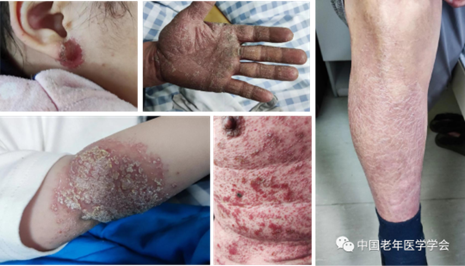The skin is always "itchy, itchy, itchy", it is this disease that makes trouble.
Tips: The pictures in this article may cause discomfort.
In dermatology, you can always hear patients saying to their doctors: I'm itchy, itchy. Take off your clothes and you can see a variety of skin manifestations. One of the most common conditions that causes itchy skin is eczema.
What is eczema?
Eczema is a common skin disease caused by a variety of internal and external factors, usually accompanied by significant itching. Eczema can be divided into three types: acute, subacute and chronic. Exudation and erosion can be seen in the acute stage. In the subacute stage, papules, scales and scabs were predominant. Chronic eczema can be seen in skin thickening, pigmentation, and lichenoid change. In short, eczema can affect different ages, different parts of the body, and present a variety of clinical manifestations. For the elderly, eczema is a common disease.

Why do you get eczema?
The cause of eczema is very complex, and external factors such as sunlight, heat, dryness, excessive sweating, friction and contact with daily necessities, internal factors such as mental state, immune system, skin barrier and so on are related. At present, there is no clear cause, but it is generally believed that there is a certain relationship with delayed allergy. Allergy refers to the body's inability to tolerate certain substances, causing immune cells to release inflammatory mediators, causing skin damage and itching. These substances can be food, cosmetics, animals and plants, metals, etc.
For elderly friends, how to prevent and treat eczema?
In terms of prevention:
1Keep your skin clean: Shower regularly, use mild detergent, pat your skin dry with a soft towel, and avoid excessive wiping.
2Avoid irritants: Avoid irritants such as chemicals, fragrances, dyes and detergents that sensitizes the skin.
3Keep skin moisturized: Use mild moisturizers, especially immediately after showering to lock in moisture. Especially the feet, hands, limbs and joints and other parts of the skin easy to dry
4Avoid excessive bathing: Frequent bathing may strip the skin of its natural oils, leading to dry skin and worsening eczema. It is recommended to adjust the number of baths according to weather conditions and skin dryness.
5Avoid hot and cold environments: Extreme temperatures can irritate the skin and trigger eczema. Keep the indoor temperature appropriate to avoid prolonged exposure to extreme weather conditions.
In terms of treatment:
1Applying moisturizers: Keeping your skin moist can help relieve eczema symptoms. Choose a mild, fragranceless moisturizer and apply it regularly.
2Avoid scratching: Scratching eczema can aggravate inflammation and irritation, try to avoid scratching, you can use cold compresses or anti-itch drugs to relieve itching.
3The use of topical drugs: It is recommended to prescribe appropriate topical creams or lotions at the hospital, such as glucocorticoids, to reduce inflammation and itching. There is no need to worry too much about hormone-containing creams, and use under the guidance of a doctor generally does not produce significant side effects.
4Use of anti-allergy medication: If itching is severe or even disrupts sleep, your doctor may recommend oral anti-allergy medication to reduce the allergic reaction and itching.
Eczema is a common and complex skin problem that requires multiple aspects of attention and management. Going to a formal medical institution to take targeted care and treatment can effectively control symptoms and even further cure the disease.
Author: Jiang Ruili and Chen Liuqing, Wuhan First Hospital
The views expressed are solely those of the author.

